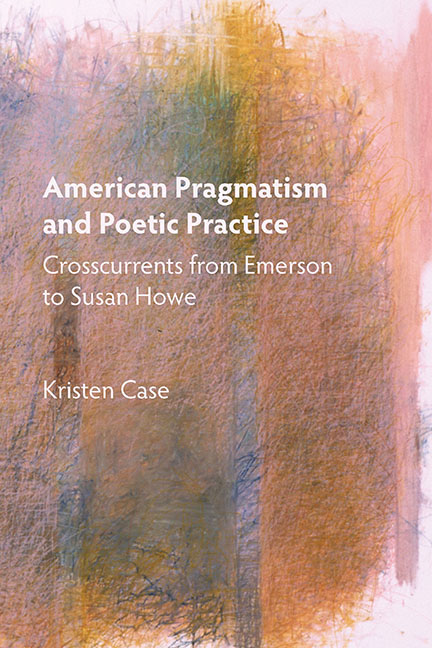Book contents
- Frontmatter
- Dedication
- Contents
- List of Illustrations
- Preface
- Acknowledgments
- 1 “By Their Fruits”: Words and Action in American Writing
- 2 Emerson, Moore, America
- 3 Robert Frost, Charles Sanders Peirce, and the Necessity of Form
- 4 “As Much a Part of Things as Trees and Stones”: John Dewey, William Carlos Williams, and the Difference in Not Knowing
- 5 Henry Thoreau, Charles Olson, and the Poetics of Place
- 6 Howe/James
- Works Cited
- Index
1 - “By Their Fruits”: Words and Action in American Writing
Published online by Cambridge University Press: 08 April 2017
- Frontmatter
- Dedication
- Contents
- List of Illustrations
- Preface
- Acknowledgments
- 1 “By Their Fruits”: Words and Action in American Writing
- 2 Emerson, Moore, America
- 3 Robert Frost, Charles Sanders Peirce, and the Necessity of Form
- 4 “As Much a Part of Things as Trees and Stones”: John Dewey, William Carlos Williams, and the Difference in Not Knowing
- 5 Henry Thoreau, Charles Olson, and the Poetics of Place
- 6 Howe/James
- Works Cited
- Index
Summary
Ye shall know them by their fruits. Do men gather grapes of thorns, or figs of thistles? Even so every good tree bringeth forth good fruit; but a corrupt tree bringeth forth evil fruit. A good tree cannot bring forth evil fruit, neither can a corrupt tree bring forth good fruit. Every tree that bringeth not forth good fruit is hewn down, and cast into the fire. Wherefore by their fruits ye shall know them.
— Matthew 7:16–20Unlike an “idea,” which, once defined and categorized, may be assigned a particular history, metaphor is mercurial, harder to delimit. My intent in this opening chapter is to trace the partial history of a metaphor (which happens also to be an allusion) as it slides, serpentine, across the ground of religious, philosophical, and poetic writing in America. Following the traces of this slippery figure, I hope to provide a sense of how thinking has moved, and moves, in ways not always accounted for in influence studies, valuable though these may be in other respects. I also hope to illustrate that, in their common turn to practice(variously defined) as the locus of meaning, the writers who initiate the pragmatist turn in American thought destabilize the boundaries between argument and form, thought and feeling, philosophy and poetry. My justification for the unorthodox structure of this chapter — indeed, of the entire book — echoes Perry Miller's defense of his own method in his 1956 introduction to his 1940 essay “From Edwards to Emerson.”
On the crudest of levels, I am arguing that certain basic continuities persist in a culture — in this case taking New England as the test tube — which underlie the successive articulation of “ideas.” Or, I might put it, the history of ideas — if it is to be anything more than a mail-order catalogue — demands of the historian not only a fluency in the concepts themselves, but an ability to get underneath them. (Errand, 184–85)
I will not attempt, in this chapter, to summarize the vast scholarship that already exists on the differences and similarities between, for example, Edwards and Emerson, or Emerson and James. I do not intend to answer the important questions about the extent of transcendentalism's inheritance from Puritanism, or whether transcendentalism's differences from pragmatism outweigh its similarities. Rather, I wish to trace what Wittgenstein, in his Philosophical Investigations, called a family resemblance.
- Type
- Chapter
- Information
- American Pragmatism and Poetic PracticeCrosscurrents from Emerson to Susan Howe, pp. 1 - 20Publisher: Boydell & BrewerPrint publication year: 2011



